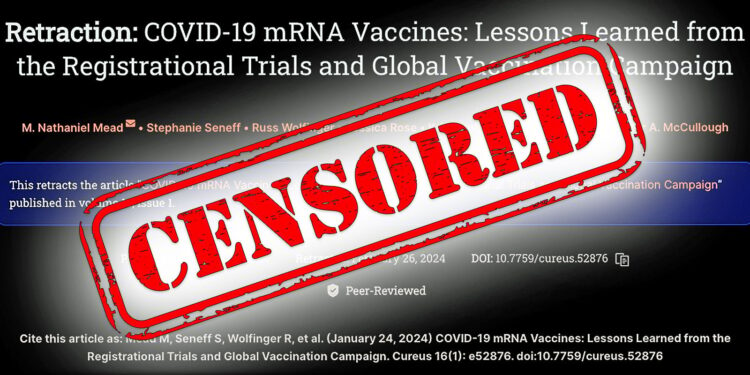The Journal Cureus has recently retracted the first peer-reviewed paper that extensively analyzed the data from COVID-19 mRNA vaccine trials and post-injection injuries. The authors of the paper also called for a global moratorium on the vaccines. This retraction has raised concerns about scientific censorship and the influence of powerful entities in the medical community.
The paper, which was published last month, highlighted potential serious harms caused by the COVID-19 vaccines, as well as issues with vaccine control and processing, adverse events, vaccine inefficacy, and mortality data from the trials. The authors concluded that the approval of these vaccines without a thorough assessment of all relevant data and consideration of risks versus benefits was not justified.
In addition to calling for a global moratorium on the vaccines, the authors also urged for their removal from the Centers for Disease Control and Prevention's childhood immunization schedule and the suspension of booster shots. The paper received significant attention, with over 350,000 reads in just one month.
The retraction of the paper has been met with criticism from the authors and other experts. Dr. Peter McCullough, one of the authors, referred to it as a “stunning act of scientific censorship” and raised concerns about potential pressure from the bio-pharmaceutical complex to suppress critical vaccine safety information. The authors rejected the retraction and plan to report this unethical action to relevant authorities.
The retraction was based on eight points of concern raised by Tim Kersjes, a research integrity staffer at Springer Nature, which publishes Cureus. However, the authors had previously addressed these concerns in an exhaustive peer-review process. They provided a detailed rebuttal to each criticism, citing evidence and supporting their arguments.
This incident highlights broader issues in scientific publishing. Dr. John P.A. Ioannidis, a Stanford epidemiologist, recently argued that peer review and scientific publication are at a crossroads. He called for research on this topic and emphasized the need to address the influence of stakeholders who may profit from or manipulate the scientific literature.
There have been concerns about biased publishing decisions and suppression of research that challenges dominant narratives, particularly in the field of COVID-19 research. Preprint servers have also been used to censor scholarly papers critical of public health agencies and policy decisions.
The retraction of the paper and the controversies surrounding it are reminiscent of past efforts to silence and discredit scientists who challenge prevailing narratives in favor of industries like Big Pharma and Big Chemical. The case of a retracted study on Monsanto's genetically modified corn and herbicide serves as an example of coordinated efforts to suppress research.
The retraction of the Cureus paper has significant implications. It not only conceals information about potential vaccine risks but also undermines the credibility of the authors and scientific research as a whole. The authors argue that these “predatory retractions” benefit the bio-pharmaceutical enterprise and call for scientists seeking the truth to explore alternative publishing venues and peer-review systems.
The incident underscores the need for transparency, integrity, and rigorous assessment in scientific publishing. It also raises questions about the influence of powerful entities and the need to protect scientific freedom and the dissemination of critical research. As scientific publishing stands at a crossroads, it is essential to address these issues to ensure that scientific literature serves science and benefits society.







